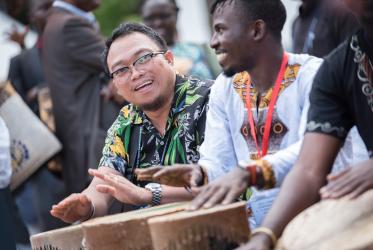A global survey on theological education urges churches to put emphasis on Christian leadership formation, collaboration in theological education, support for scholarship programmes and development of capacity-building for theology students.
The report of the global survey is now available online.
The report will be presented to the annual consortium meeting of the Global Digital Library for Theology and Ecumenism (GlobeTheoLib) by the World Council of Churches (WCC). The meeting is set to take place from 20 to 21 September in Geneva, Switzerland.
The survey on theological education is a first of its kind since the 1910 World Missionary Conference in Edinburgh, which produced a similar report.
The survey has gathered data and perspectives on all forms of theological education from diverse Christian traditions. The project was launched in October 2011 at a meeting in Indonesia by the WCC in partnership with the Institute for Cross-Cultural Theological Education in Chicago and the Center for the Study of Global Christianity (CSGC) in Boston, United States.
According to Dr David Esterline, director of the Institute for Cross-Cultural Theological Education in Chicago, the report shows that “there are not enough theological schools in world regions where Christianity is growing rapidly, including Africa, Latin America and parts of Asia.”
He said that theological education is financially unstable in many parts of the world.
The report shows “growth in Evangelical and Pentecostal-Charismatic theological education; with a decline in mainline Protestant and Roman Catholic traditions,” Esterline added.
He said that the report documents interest in online theological education in some parts of the world, while for other educators traditional means remain the preferential choice.
Rev. Dr Dietrich Werner, coordinator of the ecumenical theological education programme of the WCC, noted that in the survey “cross-cultural communication and practical skills related to Christian ministry were highly recommended”. Respondents to the questionnaire affirm these skills as of primary importance for strengthening theological education, he said.
Several respondents considered a combination of experiential education in congregations and traditional academic work, a way to strengthen theological education, Werner added.
Todd Johnson, director of the CSGC, also referred to the significance of the report, which he said highlights the “strategic importance of theological education for mission and social witness in the context of rapidly changing World Christianity.”
“Issues related to theological education have strategic importance for the future World Christianity, as shown by the report,” he added.
The survey findings are based on empirical data on current developments, challenges and major trends in theological education. The data was collected through a questionnaire for ecumenical partners, as well as individual and institutional theological educators.
Started in October 2011, and concluded in June 2013, the global research project in its 21-month period has gathered responses from over 1,650 theological educators and church leaders.
The summary report of the global survey on theological education will be presented at the 10th Assembly of the WCC, to be held from 30 October to 8 November in Busan, Republic of Korea.
Global Survey on Theological Education: 2011-2013 - Summary of Main Findings
Ecumenical Theological Education – Global Dialogue Platform
Global Digital Library on Theology and Ecumenism
Center for the Study of Global Christianity
Institute for Cross-Cultural Theological Education





